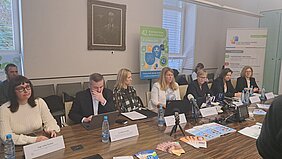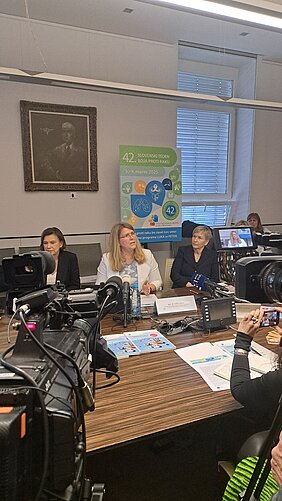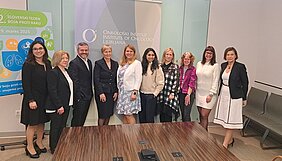Slovenia is taking a strategic, stepwise approach to investigating and introducing new organized, population-based cancer screening programmes for lung and prostate cancer screening. The goal is to maximize benefits, minimize harms, and ensure sustainable implementation. To achieve this, it is essential to address key challenges specific to each screening programme while also ensuring their seamless integration into the Slovenian healthcare system.
Slovenia is celebrating the Forty-Second Slovenian Week Against Cancer, focusing on cancer prevention, on 3-9 March 2025. This year’s theme, "A New Breeze in the Fight Against Cancer – Exploring the Potential of Lung and Prostate Cancer Screening in Slovenia," highlights the country’s commitment to advancing cancer screening. The week commenced with the official launch of the "Improving Cancer Screening in Slovenia – ICSIS" project, funded by the European Union (EU) through the Technical Support Instrument (TSI) and implemented in collaboration with the European Commission’s Reform and Investment Task Force. The project brings together the International Agency for Research on Cancer, the cancer research agency of the World Health Organization (IARC/WHO) and Erasmus MC, the Netherlands, whose expertise will support Slovenia in exploring the stepwise implementation of screening programmes for lung cancer and prostate cancer. Additionally, ICSIS will contribute to the planning and piloting of a new approach to screening for cervical cancer within the organized, population-based ZORA programme. Following the project launch, the partners held a press conference to officially start the Forty-Second Slovenian Week Against Cancer. Organized by the Association of Slovenian Cancer Societies in collaboration with the Institute of Oncology Ljubljana (OIL), the Ministry of Health, and the National Cancer Control Programme (NCCP), the event provided key insights into Slovenia’s cancer screening activities. The media were informed about how ICSIS will support national implementation research projects LUKA (lung cancer screening), PETER (prostate cancer screening), and ZORA RENEWAL (cervical cancer screening). The Ministry of Health and the Slovenian Research and Innovation Agency (ARIS) fund these projects, led by the OIL.
Official Launch of the Improving Cancer Screening in Slovenia (ICSIS) Project
The new EU Council recommendations of 9 December 2022 on strengthening prevention through early detection: A new EU approach on cancer screening replacing Council Recommendation 2003/878/EC, recommend that EU member states explore a stepwise investigation of the feasibility and effectiveness of organized, population-based screening programmes for lung cancer and prostate cancer, as well as screen-and-treat strategies for preventing stomach cancer in certain European regions. Additionally, they suggest modifications to existing screening programmes for cervical, colorectal and breast cancer. With the support of EU funding through the TSI, international experts and institutions such as IARC/WHO and Erasmus MC will actively contribute to improved cancer screening in Slovenia, further strengthening Slovenia’s efforts in cancer prevention.
Dr. Elisabete Weiderpass, IARC director explains: “IARC, as a global leader in cancer prevention and early detection, brings extensive expertise in supporting national cancer control programmes across diverse settings. The ICSIS project aligns with the European Council’s updated recommendations and supports Slovenia’s National Cancer Control Program (NCCP) 2022-2026. Our goal is to provide expertise and support Slovenia to strengthen their cancer screening programmes.”
Andre Carvalho, project ICSIS lead from IARC/WHO continues: “As the lead of the ICSIS project, IARC/WHO supports Slovenia in planning the implementation of organized, population-based pilot programmes for lung cancer and prostate cancer screening, and upgrading cervical cancer screening with the shift to HPV testing, based on the evaluation of local capacity, stakeholder engagement, health economic analyses, and targeted communication strategies. By collaborating closely with national stakeholders, we will co-create strategies that are context-appropriate to enhance cancer screening in Slovenia.
Erasmus MC is an expert centre for decision modelling to inform cancer screening policy. As part of the ICSIS project, Erasmus MC will perform decision modelling for the Slovenian context to help plan resources for the implementation of the different cancer screening programmes in Slovenia. “This will aid Slovenian policymakers in the resource allocation and preparation to ensure programme success. An important aspect of the ICSIS project is building capacity in Slovenia for decision modelling. As part of this capacity building, a selection of local researchers and policy makers will be trained in developing, applying and interpreting decision modelling for health interventions. This way, future health policy decisions and implementation can be supported by analyses by local entities,” explains prof. dr. Iris Lansdorp-Vogelaar, Professor of Decision Modelling in Screening from Erasmus MC in the Netherlands. “Furthermore, Erasmus MC has international recognised expertise in lung cancer screening research. In 2020, the NELSON trial showed evidence that volume CT screening for lung cancer reduced lung cancer-related mortality in a high-risk population, which formed the basis for further international developments. With 4-IN-THE-LUNG-RUN, a high-quality implementation trial is ongoing to establish lung cancer screening strategies which have demonstrated to be effective, affordable, acceptable to the population, cost-effective, and suitable for implementation, through a risk-based personalised screening strategy.”
Systematic approach to new cancer screening programmes in Slovenia
The National Screening Committee was established in Slovenia in 2020 by the Ministry of Health with the aim to develop a structured framework for decision-making on the introduction of new organized, population-based screening programmes in the country, to assess the scientific justification, benefits and harms as well as cost-effectiveness and feasibility of new screening programs, guide their development and step wise organized implementation. New screening approaches are also included in the NCCP 2022–2026. Since 2023, the Slovenian Ministry of Health has co-financed two targeted research projects: Project LUKA (lung cancer screening) and Project PETER (prostate cancer screening), both led by the Institute of Oncology Ljubljana. Under these projects, multidisciplinary teams of experts from healthcare institutions across Slovenia are developing professional and organizational frameworks for the potential introduction of new screening programs in Slovenia, within the Expert Groups for Lung and Prostate Cancer of the NCCP.
Vesna Marinko, Director General of the Public Health Directorate at the Ministry of Health reflects on the successful and sustainable implementation of the three cancer screening programmes in Slovenia and emphasises the strong support of the ministry to organised, population-based cancer screening in Slovenia: "The Slovenian cervical (ZORA), breast (DORA) and colorectal (SVIT) cancer screening programs have been recognized internationally as examples of best practice. The Ministry of Health has always been a strong advocate for the introduction of organized, evidence-based screening programs at national level and has provided a supportive environment for their implementation, including the necessary legislative framework. With the goal of keeping Slovenia among the European countries which offer to their citizens all evidence-based and recommended organised, population-based cancer screening programmes, we have already taken significant steps towards a stepwise approach to introducing new screening programs."
“Last year, the National Screening Committee gave the green light to the proposals made by LUKA and PETER projects to start step-wise preparation and submission of the professional and organizational background documentation for organised, population based lung and prostate cancer screening programmes according the National Screening Committee guidelines. This will allow Slovenia a systematic and structured assessment of the justification and feasibility of population-based organized screening for lung and prostate cancer in national setting. If the programmes will be justified from both a medical and economic perspective, sustainable within the Slovenian healthcare system, and would not pose a risk to prolong the time to diagnosis or treatment for symptomatic patients, their gradual implementation will be advised until they are accessible to all eligible individuals. We are pleased that Slovenia is supported on this journey by renowned institutions and experts from abroad, such as IARC/WHO and Erasmus MC,” explains Urška Ivanuš, head of the National Screening Committee and head of the ZORA screening programme, who applied for technical support of international experts to Slovenia via the European SG-REFORM TSI.
"Prostate and lung cancer are among the most common cancers, both in Europe and Slovenia, where prostate cancer is the most frequently diagnosed cancer in men, while lung cancer ranks second in both men and women. We are looking forward on detecting lung cancer at an earlier stage, as it is currently the leading cause of cancer-related deaths in both women and men. The survival rate of lung cancer patients is low mainly because it is usually diagnosed late. If we were to detect it earlier through a screening program, we could save lives. Since lung cancer is largely linked to smoking, it is of utmost importance that, as part of the LUKA project, we also plan additional efforts to prevent smoking initiation and support smoking cessation," explained Prof. Dr. Janja Ocvirk, Medical Director of the Institute of Oncology Ljubljana. “In Slovenia, we have had opportunistic prostate cancer screening for many years, but it has not led to a reduction in mortality from this cancer. The PETER project therefore aims to lower the harm of opportunistic screening and increase benefits through the organized, population-based approach to prostate cancer screening, following the model of existing screening programs."
"I am extremely excited about the possibility that, in the future, two new programs, PETER and LUKA, might join Slovenia's highly successful screening programs ZORA, DORA, and Svit. PETER would even be the first program dedicated exclusively to men. At the Institute of Oncology Ljubljana, we will do everything to ensure that both programs are professionally and organizationally well-prepared," stated Zlata Štiblar Kisić, Director of the Institute of Oncology Ljubljana. "The Institute of Oncology Ljubljana is the leading institution for two screening programs, ZORA and DORA, which we are extremely proud of. We will now use our expertise from establishing and managing these programs in the development of the new ones. Implementing a new organized screening program is a complex, professionally demanding, and responsible process that can only be successfully introduced and carried out through collaboration with key stakeholders. Therefore, we are pleased to be starting a strong collaboration with renowned international experts, whose support was invaluable in the past when we established our existing screening programs."
Widespread opportunistic prostate cancer screening in Slovenia
“Widespread opportunistic prostate cancer screening in Slovenia has not led to a decrease in mortality; prostate cancer mortality in Slovenia remains higher than the European average. No information is available regarding the harms of such screening,” explains Janka Čarman, leader of the PETER project and head of the Prostate Cancer Expert Group at NCCP. “The opportunistic PSA testing contributes to overdiagnosis and potential overtreatment. Overdiagnosis can be reduced by using a risk-stratified approach in screening. The goal of an organized screening programme is to identify men with aggressive prostate cancer who require treatment, reducing prostate cancer mortality and improving patients' quality of life. Since there is no effective primary prevention against prostate cancer, a reduction in incidence is not expected, but we do expect a lower incidence of locally advanced cancers and metastatic disease. Since the treatment of advanced stages is associated with increased treatment costs and poorer quality of life, lower costs and better quality of life are expected with organized screening. Capacity needs for organized population-based prostate cancer screening will be assessed based on the results of a demonstration pilot trial, which will commence this year under the project financed by the Union for International Cancer Control (UICC) with the support of the Ministry of Health. Men aged 50 to 69 will be invited to participate. The project is expected to inform future planning as well as policy decisions on prostate cancer screening in Slovenia and contribute to ongoing research efforts in the EU."
Despite advances in modern treatment, lung cancer remains one of the cancers with the poorest prognosis
Tobacco smoking remains the primary risk factor for lung cancer, accounting for over 80% of cases. Lung cancer is the third most common cancer in Slovenia, with approximately 1,600 new cases annually. It is the leading cause of cancer-related deaths, responsible for one in five cancer deaths, with about 1,200 deaths each year. "The five-year survival rate for lung cancer patients is approximately 25% and has only slowly improved. Treatment is more effective when lung cancer is detected early, but only around 20% of cases are diagnosed at an early stage. In these cases, five-year survival exceeds 60%. Unfortunately, most lung cancer patients are diagnosed at an advanced stage, where curative treatment is usually not an option. Recent studies on low-dose computed tomography (LDCT) screening for long-term smokers have demonstrated a significant reduction in lung cancer mortality. Our lung cancer screening programme will follow these findings, targeting long-term smokers aged 50–74. The goal is to reduce lung cancer mortality by 20–25% by increasing the proportion of early-stage diagnoses from 20% to 60%. Smoking cessation programmes will also be an integral part of the screening programme. The main challenges for the screening programme will be the identification of smokers, the response to the invitation to the screening programme, and the provision of staff and other resources," stated Martina Vrankar, leader of the LUKA project and head of the Lung Cancer Expert Group at NCCP.
Additional Information on the Forty-Second Slovenian Week Against Cancer and Event Programme
The Slovenian Association of Cancer Societies, along with its 11 regional societies, is the country’s oldest NGO in the field of cancer prevention, with a mission to contribute to a Slovenian society where no one will develop or die from cancer due to their lack of knowledge or due to the detachment of the state.
The Week Against Cancer includes various activities aimed at informing the public about evidence-based cancer prevention measures. Over the years, the European Code Against Cancer has become one of the primary guiding principles in shaping the Association’s strategic objectives and activities.
Attachments to the Press Release:
• Programme of the 42nd Slovenian Week Against Cancer
• European Code Against Cancer (in Slovenian language)
• Annual report of the Association of Slovenian Cancer Societies
• Link to IARC's news item
Contact Information:
Association of Slovenian Cancer Societies Trubarjeva 76a, Ljubljana
E: [email protected]
W: http://www.protiraku.si
Institute of Oncology Ljubljana
Public Relations Department
Zaloška 2, SI-1000 Ljubljana
E: [email protected]
W: www.onko-i.si










